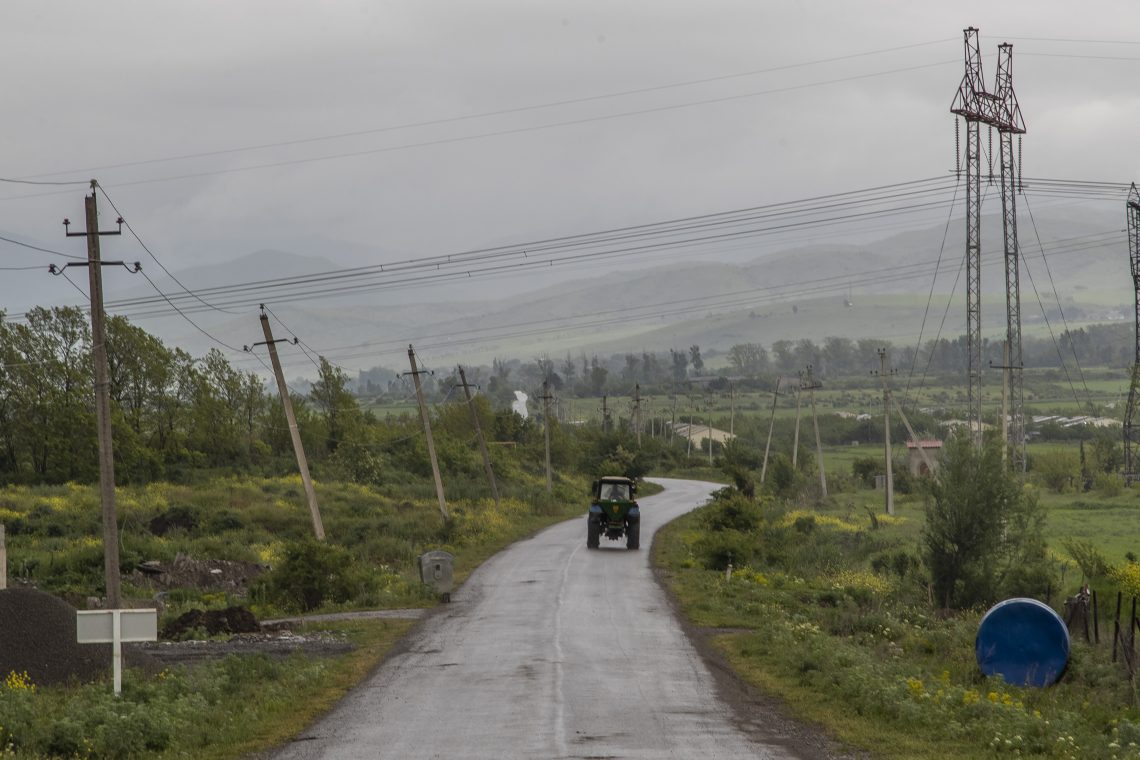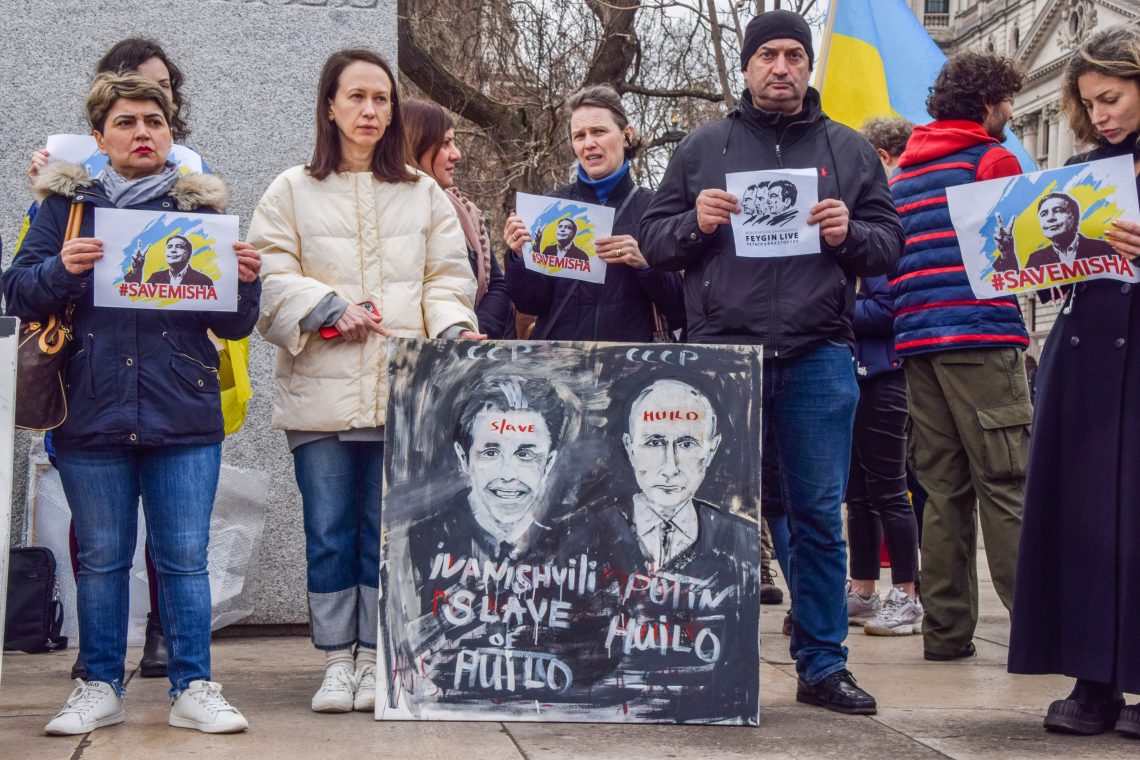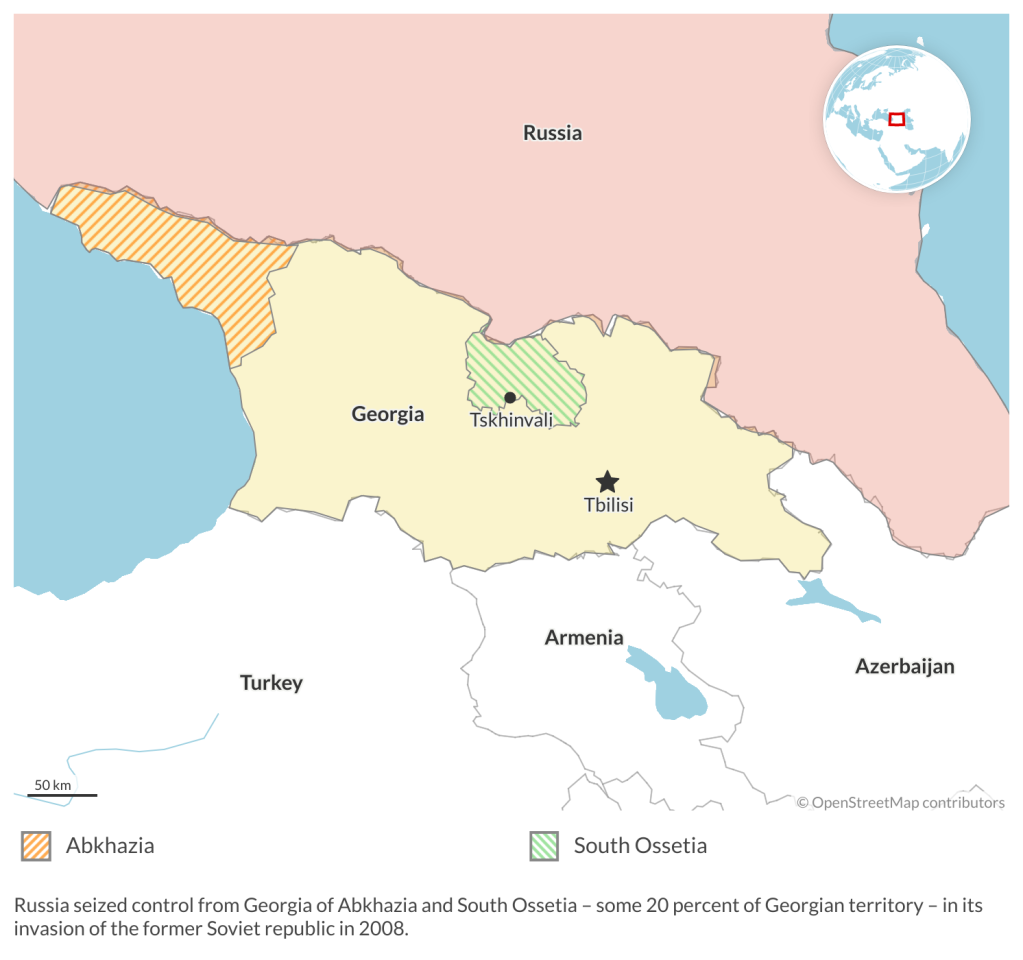Georgia’s divide between Russia and the West
While most Georgians favor closer ties with the West, the government that is backed by billionaire Bidzina Ivanishvili is undermining these efforts in favor of Moscow.

In a nutshell
- Georgia’s pro-Western president seeks return of South Ossetia and Abkhazia
- The Russian-friendly prime minister is not interested in Western integration
- The showdown will come to a head in the 2024 parliamentary elections
On May 21, Georgian Airways announced it was banning the nation’s president, Salome Zourabichvili, from travel on the flagship carrier until she was ready to “apologize before the Georgian people.” This rather odd decision came in response to an announcement by President Zourabichvili that she would boycott the airline because it resumed direct flights to Russia.
The seemingly childish tit for tat reveals just how deeply divided the country has become in managing its relations with Russia. While Georgian society remains broadly convinced of the merits of closer ties to Europe, the Georgian government, led by Prime Minister Irakli Garibashvili, is hard at work maintaining good relations with Moscow. Future developments offer two distinctly different scenarios.
In one direction, the current government perseveres and proceeds to win the upcoming parliamentary elections in 2024. Russia will then have retained at least one friendly neighbor in the South Caucasus, and Georgian relations with the European Union will deteriorate even further. In the other, society prevails, and a new government comes to power. Georgia will then resume its process of seeking deeper integration with the West and Russia will have lost one of the last footholds in its “near abroad.”
More by Stefan Hedlund
Georgia’s future may hinge on Russia’s war in Ukraine
Geopolitical transformation in the South Caucasus
Central Asia is coming into its own
Russia’s use of frozen conflicts in post-Soviet space
This choice suggests that the geopolitical implications of the Georgian choice go far beyond relations with the EU. At stake is the Russian use of frozen conflicts as a tool of foreign and security policy. Russia’s invasion of Ukraine in 2014 provides a flagrant example of how these games have served to shroud the imposition of control over foreign territories in a cloak of deniability.
Via the deployment of “little green men” to seize and occupy Crimea, the Kremlin succeeded in retaining control over vital military installations. Through the subsequent creation of two enclaves in eastern Donbas, it advanced its aim of overturning the constitutional order in Ukraine.
Fearful of being drawn into a serious conflict, the major Western powers proved only too happy to play along with the Kremlin’s brazen denials of involvement. Instead of providing Ukraine with robust support, they engaged in endless charades of mediation and various “formats” that in practice served to keep the conflict frozen. It all worked just fine until Russia’s full-scale invasion on February 24, 2022.
Ukraine is not the only example of how the Kremlin has played its games of frozen conflicts. The defining case emerged in the early 1990s, when Russia provided military support for Armenia to intervene on the side of ethnic Armenians in a war for control over Nagorno-Karabakh inside Azerbaijan. The outcome was the formation of a self-proclaimed Republic of Artsakh. Behind a facade of endlessly futile mediation by the Organization for Security and Co-operation in Europe, Russia acted as regional hegemon, maximizing its influence by providing weapons to both sides.
A second early example was Moldova, where the dissolution of the Soviet Union resulted in a conflict between the Moldovan government and a Russian-speaking minority on a small sliver of land along the east bank of the Dniester River. Backed by the remnants of the Soviet 14th Army, the pro-Russian minority proclaimed the Pridnestrovian Moldavian Republic, commonly known as Transnistria, that would give Moscow a foothold inside Moldova.
The endgame may be near in Ukraine, Moldova and Georgia
In all three cases, the endgame is approaching. In Nagorno-Karabakh, the frozen conflict was resolved with military force in 2020, when Azerbaijan launched a military offensive to reclaim territories long occupied by Armenia. The recent agreement by Baku and Yerevan on mutual recognition of territorial integrity implies that the Republic of Artsakh is history, and that Russia is out of that game.
In Ukraine, the frozen conflict has been transformed into an open war where Russia has no deniability and relies on brute force. Although opinions are divided on whether Crimea and Donbas will be fully liberated, it is now a different game, where the appetite of Western leaders for lengthy conversations with Russian President Vladimir Putin has been greatly reduced.
In Moldova, fears that the Russian war against Ukraine would be extended to include the garrison in Transnistria have abated and the danger of a Russian-inspired coup against the legitimate government is being countered. During his recent visit, President Volodymyr Zelenskiy warned Russian troops that if they wanted to live then they had better leave soon. This suggests that Ukraine may be getting ready to join forces with the Moldovan government in also putting an end to the Transnistrian episode.
Facts & figures
Why pro-Russian sentiment remains in Georgia
The case of Georgia will now appear center stage. It was the first among the former Soviet republics to suffer a Russian armed invasion. The five-day war in August 2008 resulted in the Russian occupation of the autonomous regions Abkhazia and South Ossetia, and the subsequent recognition of the two as independent states. When many others began turning their backs on Moscow, one might have thought that Georgia had good reason to follow suit.
The reason why Tbilisi has been reluctant to take a stand against Russia dates to 2012, when strongly pro-Western Mikheil Saakashvili was defeated and power was transferred to Bidzina Ivanishvili, a Georgian-born billionaire who had made a fortune in Russia during the 1990s. Although Mr. Ivanishvili would only serve a brief stint as prime minister, his party – Georgian Dream – has since been in control of Georgian politics. Ruling from behind the scenes, his agenda has been to maintain a formal facade of continued rapprochement with the EU, while discretely cultivating good relations with Russia.
Given that Georgia may provide the final act in the drama of Russian frozen conflicts, its domestic politics take on a special significance.
Russian lifts visa and flight restrictions
The trigger for the spat over Georgian Airways was a decision by the Kremlin, announced on May 10, to scrap a four-year ban on visas for Georgian nationals and on direct flights to Georgia. Although the move caught the Georgian government by surprise, Prime Minister Garibashvili responded positively: “Everything that will make life, movement and doing business easier for our citizens is, of course, positive and welcome.” Landing rights for two Russian airlines, and for Georgian Airways, were swiftly granted.
If the Kremlin’s rationale in lifting the bans was to shore up whatever foreign friends it still thought it had, the move backfired badly. The Georgian political opposition branded it as a provocation, and President Zourabichvili wrote on Twitter that “resuming direct flights and lifting the visa ban with Georgia is unacceptable as long as Russia continues its aggression on Ukraine and occupies our territory!” When the first flight from Moscow landed at Tbilisi airport on May 19, travelers were met by hundreds of angry protesters carrying placards saying, “You are not welcome here.”

Visit of Russian foreign minister’s daughter triggers protest
The situation was inflamed further when it transpired that the daughter of Russian Foreign Minister Sergei Lavrov, Ekaterina Vinokurova, had arrived in Georgia to attend the wedding of her husband’s brother, Alexander Vinokurov. When her presence became known, protesters surrounded the Kvareli Lake Resort hotel that had been booked for the ceremony, and President Zourabichvili branded it unacceptable that persons under Western sanctions could be welcome in Georgia.
Current relations between Brussels and Georgia are marked by a strong sense of “Georgia fatigue.” The EU’s frustration over the evasive policies of the Georgian government recalls the “Ukraine fatigue” it developed in response to the pro-Russian policies of President Viktor Yanukovych that culminated in the Euromaidan Revolution that forced the Kremlin-backed leader to flee in 2014.
When the European Commission decided in June 2022 to offer Ukraine and Moldova candidate status, Georgia was excluded. The Georgian refusal to join sanctions against Russia, and to provide even nonmilitary assistance to Ukraine, has not made relations any better. And the kettle really came to a boil when Prime Minister Garibashvili used an appearance at a security forum in Bratislava at the end of May to toe the Kremlin’s line, claiming that NATO expansion is to blame for the conflict in Ukraine.
Scenarios
The pro-Western scenario assumes that Georgian society manages to keep up the momentum and that a new government is indeed elected in 2024. What speaks in favor of this scenario is that although Georgian Dream – and Mr. Ivanishvili – have had a good run, over the past year the government has been making some bad calls.
The spat surrounding Georgian Airways, and the wedding attendance by Mr. Lavrov’s daughter, reflected tensions that had come to a head in early March this year. Inspired by the notorious Russian law on “foreign agents,” the Georgian government introduced a bill that targeted nongovernment groups and media that accepted more than 20 percent of their financing from abroad. The proposal was met by mass protests and even rioting, prompting the government to withdraw it unconditionally.
With a new government in power in 2024, President Zourabichvili is likely to win international support for her demand that any settlement of the war in Ukraine must entail a withdrawal of all Russian troops from Georgian territory. A process of reintegration of Abkhazia and South Ossetia may then begin, putting a formal end to the story of the Kremlin using frozen conflicts and non-recognized states as tools of foreign and security policy.
The problem is that longer-term normalization will require more than just ejecting Russian troops. Bringing an end to Russian influence would not only require that all legal arrangements imposed by Moscow, such as trade agreements and formal recognition of statehood, be declared null and void. While the Kremlin might be coerced into accepting this transformation, selling it to the concerned populations will be a different matter.
The alternative scenario departs from the magnitude of the challenge that will face Western governments in dealing with the aftermath of Russia’s frozen conflicts. Proclaiming support and holding up visions about an EU “membership perspective” is easy enough. Ensuring that citizens remain convinced of the merits of joining the West is a different matter.
If the Ukrainian armed forces do put an end to Russian control of eastern Donbas, the government in Kyiv will still be faced with the residuals of Russian influence and indoctrination. Those who have remained are Russian speakers who have accepted Russian passports, received Russian pensions and benefited from Russian social services. Unless a postwar settlement entails a substantial improvement in living conditions, which seems a tall order, they will be susceptible to pro-Russian agitation.
A similar challenge faces the government in Moldova, which currently projects a vision of membership in the EU by 2030. If the EU and other Western donors and partners fail to deliver on such hopes and dreams, then the backlash may again provide fertile ground for pro-Russian agitation. This will apply not only to those who have resided in Transnistria and may be expected to harbor strong pro-Russian sympathies. It also applies to all those citizens of Moldova who have long been divided on whether to prefer Russia or Europe.
In the case of Georgia, finally, the challenge entails not only making peace with the populations in Abkhazia and South Ossetia that have long sought independence. Equally challenging is the task of ensuring that Georgian society at large remains convinced of the wisdom of joining Europe. It is this latter challenge that makes Georgian domestic politics so important to watch.
If the Georgian government fails to assert Western values and to reintegrate citizens that over the years have been influenced by Russian propaganda and indoctrination, then Russia may find fertile ground to claw back influence and start rebuilding a sphere of influence. And if Russia does manage to retain influence in Georgia, then the task of reintegrating the eastern part of Ukraine will be made all that more difficult.
On balance, the likely outcome is that a Russian defeat in Ukraine will enhance the prospects for broad normalization. It will be a long slog, but the West appears committed to staying the course for as long as it takes.









